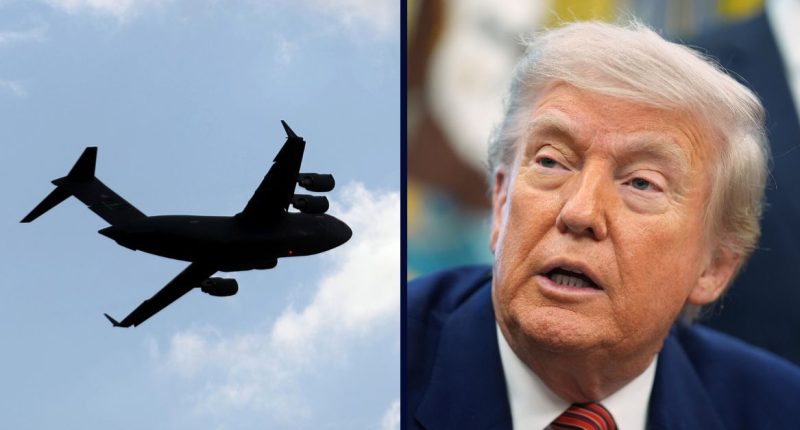Share this @internewscast.com
Left: A U.S. military aircraft departs from Fort Bliss in El Paso, Texas, on Thursday, Jan. 30, 2025, transporting migrants being deported to Guatemala (AP Photo/Christian Chavez). Right: President Donald Trump addresses reporters after signing executive orders on nuclear energy in the Oval Office at the White House, Friday, May 23, 2025, in Washington (AP Photo/Evan Vucci).
A judge mandated on Friday that the Trump administration must take action to return a Guatemalan immigrant deported to Mexico despite his fears of persecution there.
U.S. District Judge for Massachusetts Brian Murphy’s decision signifies the third directive requiring the administration to “facilitate” the return of an immigrant considered improperly deported. In his 14-page document, Murphy highlights the “horror” associated with the removal of the man, identified only as “O.C.G.,” and demands an update within five days on the progress of his return.
“No one has ever suggested that O.C.G. poses any sort of security threat,” Murphy, a Joe Biden appointee, wrote. “In general, this case presents no special facts or legal circumstances, only the banal horror of a man being wrongfully loaded onto a bus and sent back to a country where he was allegedly just raped and kidnapped.”
“Finally, it must be said that, while mistakes obviously happen, the events leading up to this decision are troubling,” Murphy added, referring to how the Trump administration initially told the judge O.C.G. had expressed no concerns to them about returning to Mexico — just to be unable to find anyone with whom the immigrant had had such a conversation.
Love true crime? Sign up for our newsletter, The Law&Crime Docket, to get the latest real-life crime stories delivered right to your inbox.
O.C.G. claims he was raped and held hostage in Mexico in April 2024 while en route to the U.S., and when he entered, he shared his fears that being returned to Guatemala would lead to persecution. An immigration judge subsequently placed a withholding order barring him from being returned to the country.
According to the filing, however, two days after being granted the withholding order in February, he was sent to Mexico, where he was offered the choice to stay and be detained indefinitely or be returned to Guatemala. He chose the latter option and reportedly remains in hiding.
“The Court finds that the public benefits from living in a country where rules are followed and where promises are kept,” Murphy wrote in his Friday order, referring to the Trump administration “confirm[ing] … that it is ‘the policy of the United States not to expel, extradite, or otherwise effect the involuntary return of any person to a country in which there are substantial grounds for believing the person would be in danger of being subjected to torture.””
“The return of O.C.G. poses a vanishingly small cost to make sure we can still claim to live up to that ideal,” he added.
The second Trump administration has been ordered twice before to return a deportee. The more famous of those incidents is the case of Kilmar Abrego Garcia, an admittedly “wrongfully deported” Maryland man who was sent back to El Salvador and imprisoned over alleged MS-13 gang ties. His attorneys and advocates have denied such involvement.
The case made it all the way to the Supreme Court, where the justices ruled the Trump administration must “facilitate” his return. The White House has countered that it is the Salvadoran government’s prerogative to deliver Abrego Garcia back to the U.S., leaving his status at a standstill.
The other similar case was of Daniel Lozano-Camargo, whom a federal judge appointed by President Donald Trump ruled was “wrongfully” deported to El Salvador in violation of a legal settlement agreement.
Still, Murphy sees O.C.G.’s case as being different than others in the past.
“‘Facilitate’ in this context should carry less baggage than in several other notable cases,” he wrote in a footnote to the filing. “O.C.G. is not held by any foreign government. Defendants have declined to make any argument that facilitating his return would be costly, burdensome, or otherwise impede the government’s objectives.”
The administration’s mass deportations have become perhaps one of the more contentious features of Trump’s agenda, with the president using several means, such as invoking the 18th-century wartime authority known as the Alien Enemies Act, as a basis for the policy.
Several federal judges have barred the administration from carrying out certain deportation actions, such as Murphy, who ruled this week that federal officials “unquestionably” violated his order by deporting several migrants to South Sudan, a country which none of the migrants are from, without due process or a reasonable opportunity to raise concerns.















